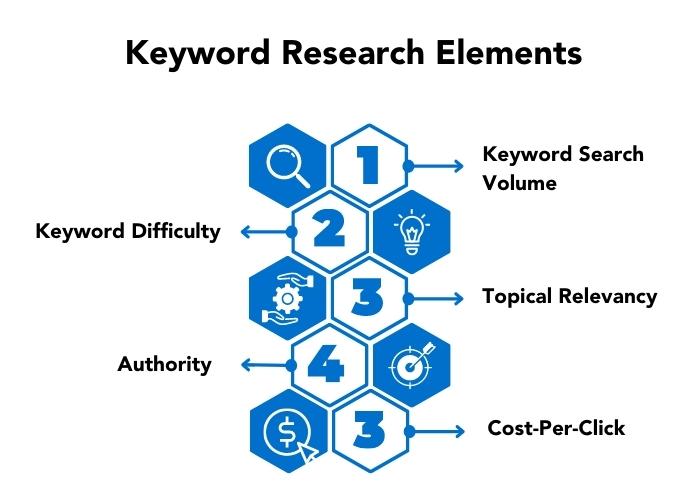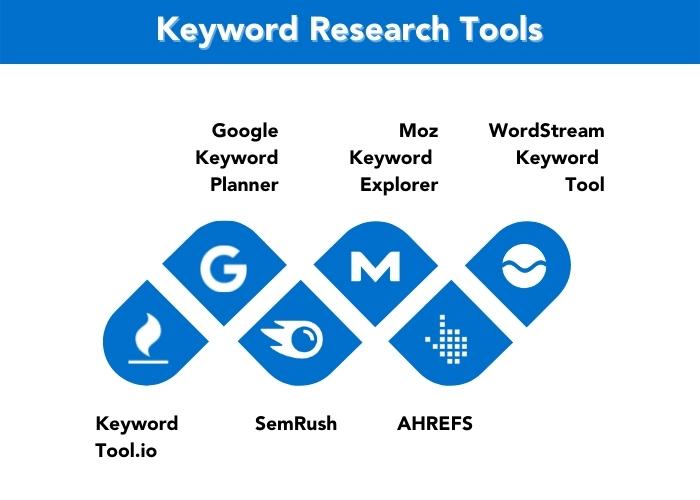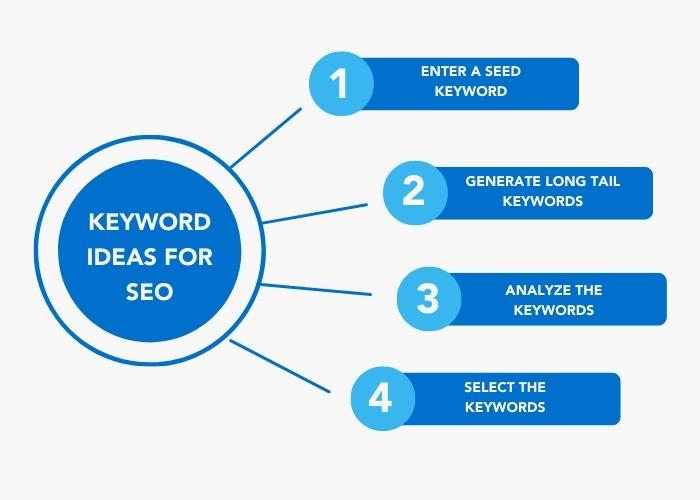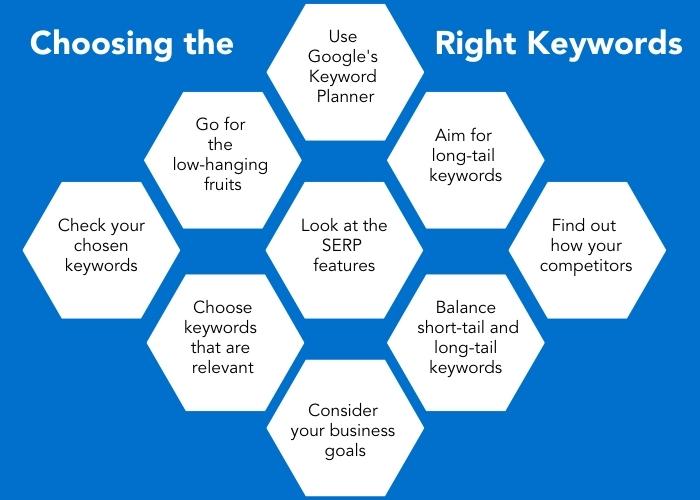How to Find Keywords for SEO
SEO, or search engine optimization, can help your website get higher rankings in search engine results pages (SERPs), bringing more traffic to your website.
To succeed in SEO, you need to find keywords that are relevant to your business and optimize your website for them.
If you already know that much, you may find yourself asking how do I find keywords exactly?

There’s a number of different tools and techniques you can use to find keywords, but how do you choose the right one?
Do you need a paid tool or are there free software options you can choose from? SEO keyword research can seem daunting if you’re new to the game, but it doesn’t have to be if you follow along below.
In this blog post we’ll discuss everything you need to know about picking SEO keywords to help your website rank higher in SERPs, gain more traffic and reach more potential customers.
You’ll walk away with a complete understanding of the topic and plenty of resources to get started monetizing your website.
What are Keywords?
Keywords are words or phrases that people use when they conduct a search or when they are trying to look for solutions online. For example, if you’re a plumber in Atlanta, some relevant keywords for your business might be “plumber,” “Atlanta,” “leak,” and “pipe.”

Why are Keywords Important?
Search engines like Google use keywords to help them understand what your website is about and how it can be helpful for users. When you include relevant keywords on your website, it tells search engines that your site is a good match for those particular terms.
This helps to improve your website’s ranking in the SERPs, making it more likely that people will find your site when they search for keywords associated with your business.
On the other hand, using irrelevant keywords may garner clicks and visitors to your website but can damage your site’s reputation. This means finding the best keywords for SEO a must if you want to get the right people visiting your site to make sales.
Now that we know why keywords are essential to your website’s SEO, the next big question is how can you find the right keywords to use? The answer is simple – keyword research.
What is Keyword Research?
Keyword research is a way to find words and phrases that people use when they’re searching for businesses like yours. This process helps businesses discover what keywords or search terms to target, how popular these keywords are (also known as search volume), the complexity level of their rankings and so much more.
There are a number of different methods you can use to conduct keyword research, but some of the most common include using keyword research tools, looking at Google Ads data, or examining your website’s existing search console data.
Once you’ve conducted keyword research to identify search terms that are relevant to your business, you can begin optimizing your website for those keywords.

Why Do You Need Keyword Research?
Conducting keyword research is important for a number of reasons. First, it helps you to understand what keywords or terms people are using when they look for businesses like yours, and what keywords gains clicks from site visitors.
This is valuable information because it allows you to focus your SEO efforts on the terms that are most likely to bring user traffic to your site. Additionally, keyword research can also help you to understand the level of competition for certain keywords and its search volume.
If you’re targeting a keyword that has a lot of competition, it might be more difficult to rank for that term. However, if you’re targeting a keyword with less competition, you might have an easier time ranking in SERPs.
It’s important to note that while most tools include an estimate on difficulty, results will vary from site to site depending on how much authority you’ve built up in relation to the competition.
With proper research, you can shape your content strategy to focus on topic ideas with the best chance of bringing in traffic.
Keyword research can also help you to understand the search intent behind certain keywords. This is the motivation or purpose behind why someone is searching for a particular term.
For example, someone who searches for the keyword “plumber” might be looking for a plumbing company in their area.
However, someone who searches for the keyword “plumbing tips” might be looking for helpful advice on fixing a plumbing issue, and not necessarily interested in hiring a plumbing contractor.
By understanding the search intent behind keywords, you can create content that is more likely to be relevant and useful for users, which can help to improve your website’s ranking in SERPs.
If you also run PPC campaigns, it is critical that you understand intent so that you’re not wasting budget on people who are not in your target audience.

SEO Keyword Research Benefits
There are a number of benefits that come with conducting keyword research. In addition to helping you to understand what keywords or terms to target, keyword research can also:
Give you valuable insights into marketing trends.
Keyword research can help you understand current marketing trends, as well as help you focus your content on important subjects and keywords that your audience is looking for.
Increase traffic to your website.
When you use the keywords that are most closely associated with your content, you will rank higher in search engine results — which means more “free” traffic to your website.
Help you create more relevant and useful content.
As we mentioned earlier, understanding the search intent behind keywords can help you to create content that is more relevant and useful for users. This, in turn , can help improve your website’s ranking in SERPs.
Make it easier to track your SEO progress.
If you’re targeting specific keywords, it will be easier to track your SEO progress and see how well your website is ranking for those terms.
This data can be valuable in helping you to understand what’s working and what isn’t, and can help you to make necessary changes to your SEO strategy.
Keyword Research Elements
There are a few different elements that you should keep in mind when conducting keyword research. These include:
Keyword Search Volume: The first element you should consider is search volume. This is the number of times that a keyword is being searched for each month. The higher the search volume, the more valuable the keyword generally is.
Keyword Difficulty: Keyword difficulty is the measure of how difficult it would be to rank for a certain keyword. The higher the keyword difficulty, the more difficult it may be to rank for that keyword.

Topical Relevancy: Google uses relevance to rank content. This is where user search intent enters the picture. Your material will only rank for a term if it satisfies the searcher’s demands.
Most importantly, your content should serve as a great resource for a specific query. It will make no sense for Google to rank your content if it provides less value than other content that’s on the web. To win in the SERPs these days, you have to outdo your competition.
Authority: Authority is the strength of your website in comparison to other websites on the internet. This means that you should put in serious effort in enriching your site’s content with helpful information, as well as promoting your content to acquire social signals and backlinks.
The higher your website’s authority, the more likely it is that your content will get higher rankings in SERPs.
Cost-Per-Click: The cost-per-click (CPC) is the amount that you would pay for each click on an ad. CPC can also be used to measure the relative competitiveness of a keyword in organic results.
The higher the CPC, the more expensive it will be to run ads targeting that keyword and the more likely it will be difficult to rank without a PPC budget.
Now that you understand the different elements of keyword research, you can begin the process of finding keywords for your website.

How to Conduct Effective Keyword Research
There are a number of different methods you can use to conduct keyword research. Some of the most common methods include using keyword research tools, looking at Google AdWords, and examining your website’s search data.
Keyword Research Tools
One of the easiest ways to conduct keyword research is by using one of the many keyword research tools available.
There are a number of free and paid tools, and they all have their own unique features and benefits. Some of the most popular keyword research tools include:

Google Keyword Planner: Google’s Keyword Planner is a free keyword tool that can be used to conduct keyword research. It allows you to see how often certain keywords are being searched for and the search volume.
You can also get estimates for the cost of running ads that target those keywords.

Moz Keyword Explorer: Moz’s Keyword Explorer is a paid tool that provides users with a number of features, including keyword suggestions, SERP analysis, and keyword difficulty scores.

WordStream Keyword Tool: With WordStream’s Keyword Tool you’ll get access to many features such as keyword suggestions and negative keyword lists. Although it is a paid tool like Moz, they offer a free trial.

KeywordTool.io: KeywordTool.io is a free keyword research tool that provides users with data from over 750 different search engines, including Google, YouTube, Amazon, and Bing.

SemRush: SemRush is a paid keyword research tool that provides users with powerful features such as keyword suggestions, search volume, SERP analysis, and competitor analysis.

AHREFS: Considered to be the gold standard of SEO tools by many, this tool is simple to use and comes with a free option if you simply prove your site ownership by connecting it via search console.
Google AdWords
Another way to conduct keyword research is by looking at Google AdWords. AdWords is an advertising platform that allows businesses to pay to have their ads appear in SERPs.
By looking at the keywords that businesses are targeting with AdWords, you can get an idea of which keywords are being used most often and are most valuable.

To do this, simply go to Google AdWords and enter a keyword or phrase into the search bar. This will bring up a list of all the ads that are currently being shown for that keyword.
You can then click on any of the ads to see more information, such as the ad copy, the URL, and the keywords that the business is targeting.
Google Trends
Google Trends is another great tool that can be used for keyword research. And it’s free!
Google Trends allows you to see how popular a certain keyword or phrase is over time. This can be useful for determining if a keyword is becoming more or less popular, which can help you make decisions about whether or not to target that keyword.

To use Google Trends, simply go to the Google Trends website and enter a phrase into the search bar. This will bring up a graph showing how popular that keyword is over time.
You can also use Google Trends to compare the popularity of multiple keywords. To do this, simply enter multiple keywords into the search bar, separated by commas. This will bring up a graph showing the popularity of each keyword side-by-side.
Website Search Data
If you have a website, you can also use your website’s search data to conduct keyword research.
To do this, simply go to your website’s search bar and take a look at the most popular searches that people are conducting. This will give you an idea of which keywords or phrases are most relevant to your website.

You can also use Google Analytics to track the keywords that people are using to find your website.
To do this, simply go to the “Acquisition” section of Google Analytics and then click on “Search Console.” From here, click on “Queries” and you’ll be able to see which keywords are sending traffic to your website.
As you can see, there are a number of different ways that you can conduct keyword research for free if you’re just getting started. Try out a few different methods and see which ones work best for you.
How to Find Keyword Ideas for SEO
Once you’ve selected your keyword research tool, you can begin the process of conducting your research. Depending on the tool you’re using, the process may vary slightly. However, there are some common steps that you’ll likely need to follow.

Step 1: Enter a Seed Keyword
The first step is to enter a seed keyword into the keyword research tool. A seed keyword is a word or phrase that describes the main topic of your content.
For example, if you’re writing an article about SEO, your seed keyword could be “SEO”. Using a seed keyword will help you identify related keywords making it easier for you to find the best keyword ideas for your website.
Step 2: Generate Long Tail Keywords
Once you’ve entered a seed keyword, the next step is to generate a list of keyword ideas. This can be done by using the various features of the keyword research tool.
For example, with Google Keyword Planner you can use the “Keyword Ideas” tab to generate a list of keywords.
Step 3: Analyze the Keywords
Once you’ve generated a list of keywords, the next step is to analyze them. This includes looking at factors such as search volume, keyword difficulty, and SERP features.
By analyzing the keywords, you can narrow down the list to the ones that are most likely to help you rank in SERPs.
Step 4: Select the Keywords
After you’ve analyzed the keywords, it’s time to select the ones that you want to target. This will be based on a number of factors, such as your business goals and the competitiveness of the keyword.
Tips on Choosing the Right Keywords for Your Website
Once you have the initial list of the keywords that you want to rank for, it’s time to refine it and pick the ones that are most suitable for your SEO strategy. Here’s how you can do this:
Use Google’s Keyword Planner to refine your list.
Using Google’s Keyword planner, you can identify and cross out any terms on your list that have too little or too much search volume. But before you cross out any keyword, be sure to check its history and projections in Google Trends.
You might be surprised that some of the low-volume terms are actually something that might be worth investing in now!
Go for the low-hanging fruits.
When you’re just starting out, it would be best to go for the low-hanging fruits or the keywords that have low difficulty score. Once you’ve built up your website’s authority, you can then start targeting the more competitive keywords.

Aim for long-tail keywords.
Long tail keywords are usually 3 to 4 words long and are more specific than the more commonly searched 2-3 word phrases. Because of this, they tend to have less competition and are easier to rank for.
In addition, long-tail keywords tend to be more profitable because they are more specific and usually result in higher conversion rates.
Check your chosen keywords’ monthly search volume (MSV)
Use Google Ads to get the average number of searches that the keyword gets per month. This will give you an idea if people are actually searching for it online.
Look at the SERP features.
When you do a Google search for your chosen keyword, take a look at the SERP features that appear on the page. These are:
- Image Packs
- Paragraph Snippets
- List Snippets
- Video Snippets
If there are a lot of SERP features, it means that Google considers the keyword to be important. This, in turn, means that it will be more difficult to rank for. On the other hand, if there are very few SERP features, it means that the keyword is not as competitive.
Find out how your competitors are ranking for your chosen keywords.
Use a tool like SEMrush to see how your competitors are ranking for the keywords that you want to target. This will give you a better idea of what you’re up against and how difficult it will be to rank for the keyword.
If your competitors are ranking for specific keywords that are also on your list, then improving your ranking for those keywords definitely make sense.
However, it’s important that you do not ignore keywords that your competitors doesn’t seem to rank for because this could be pave your way to owning a market share on important search terms.
Choose keywords that are relevant to your business.
The keywords that you choose should be relevant to your business. This means that they should be related to the products or services that you offer. Not only will this help improve your chances of ranking in SERPs, but it will also ensure that the traffic that you do get is relevant and has a higher chance of converting.
Maintain a balance between short-tail and long-tail keywords.
It’s important to have a mix of both short-tail and long-tail keywords in your SEO strategy. This is because short-tail keywords tend to be more general and have more search volume, while long-tail keywords are more specific and have less search volume.
Having a mix of both will ensure that you are able to drive traffic to your website from a variety of different sources.
Consider your business goals.
Your business goals will also play a role in choosing the right keywords. For example, if your goal is to increase brand awareness, you’ll need to choose keywords that are more general and have higher search volume.
On the other hand, if your goal is to generate leads, you’ll need to choose keywords that are more specific and have a higher conversion rate.
Once you’ve gone through all of these steps, you should have a list of keywords that are relevant to your business and that you can reasonably rank for in SERPs. From here, you can start creating content around these keywords and optimizing your website for SEO.
How to Use Your Chosen Keywords for SEO
Once you have your list of keywords, it’s time to start using them for SEO. Here are a few tips:
Include the keyword in your title tag.
The title tag is one of the most important elements of on-page SEO. This is because it tells search engines what your page is about. Make sure that your title tags are unique and include the keyword that you’re targeting. A properly optimized title tag will help your page rank higher in SERPs for that keyword.

Include the keyword in your meta description.
The meta description is another important element of on-page SEO. This is the short description that appears under your title tag in SERPs.
Like the title tag, the meta description should be unique and include the keyword that you’re targeting. This will help entice people to click on your listing when they see it in SERPs.
Include the keyword in your H1 tag.
The H1 tag is an HTML element that is used to indicate the title of a page. Unlike the title tag, the H1 tag is not visible in SERPs. However, it is still an important element of on-page SEO. So be sure that your H1 tags are unique and include the keyword that you’re targeting. This will help search engines understand what your page is about and index it accordingly.
Include the keyword in your content.
Once you have your title, meta description, and H1 tag set up, it’s time to start writing your content. Make sure that your content is informative and well-written. In addition, include the keyword that you’re targeting a few times throughout the article. It may even help a little to bold your keywords when it is appropriate.
However , don’t overdo it. A few strategically placed keywords will do the trick.
Optimize your images.
In addition to optimizing your website’s text, you should also optimize your images or your site’s media. This can be done by including keywords in the file name and alt text of your images. This will help search engines understand what your media is about and index them accordingly.
Link to your website.
One of the most important things that you can do for SEO is to link to your own website from other websites. This is called backlinking.
Backlinks are a key ranking factor for SEO. So the more backlinks you have, the better. There are a few ways to get backlinks. One is to reach out to other websites and ask them to link to your website. Another is to create great content that other websites will want to link to.
There you have it! These are the steps that you need to know so you can find the right keywords for your SEO strategy. Just remember to be patient and consistent in your efforts, and you will see results in no time.
Do you want to know more about SEO strategies and how to find the right keywords for your website? Check out our blog for more tips and tricks!



